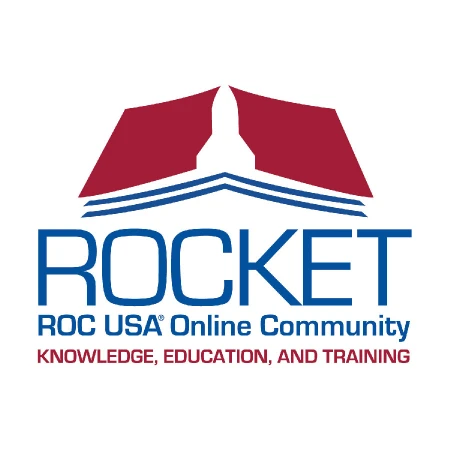
ROCKET
ROC USA’s Online Community for Knowledge Education and Training
ROCKET is a FREE online learning program for ROC residents to learn and grow as ROC Members and leaders.
All you need is a laptop, tablet or smart phone, Internet access and headphones (optional!) to learn about topics such as: running effective meetings, building community engagement, conflict resolution, understanding ROC financials and many more!
With ROCKET, you can choose from on-demand, self-paced courses, live webinars and workshops on Zoom or blended learning that combines both live sessions and courses on your own time!
Registration is now open for the Winter 2026 Quarter!
January, February, and March
Once you register, you’ll have access to ROCKET trainings for the entire Winter Session. Registration is first come, first served with a limited number of spots per session. If registration is full, we will put you on the list for the next session. Click on the training registration button below. You will receive instructions on how to access your new ROCKET account before the start of your session.
ROC Core Courses
These trainings cover everything you need to know about running a ROC, from understanding your role, to compliance, and community operations. With downloadable guides and other helpful resources, it’s designed to make learning easy and efficient.
ROC101 is a foundational training to help ROC Members learn the business and basics of operating and governing their ROC. This course explains how ROC USA® and the larger ROC USA® Network work together to support ROCs and their Members. Completing this self-paced training and working closely with your ROC’s technical assistance provider (TA) will provide a strong foundation of knowledge, understanding, and resources to support you in your first years as a ROC or as a refresher that you will continue to build upon in future trainings, activities, and experiences. Learning Outcomes for this course include: • Recognize ROC USA’s model of cooperative ownership • Define roles of Board Members and Residents in ROC governance • Describe governing documents of the ROC • Describe strategies for overseeing the financial health of the ROC • Recognize examples of legal, internal, and external compliance for ROCs This course is eligible for IACET CEUs. Learners who complete the course and choose to take the optional assessment, scoring at least 80%, will earn 0.3 CEUs.
ROC100 is a training that explains the ROC Board of Director’s roles and responsibilities, governing documents, and leadership tools to provide a foundation for a successful ROC. Additional topics include: Cooperative principles, record keeping, Board and Member meetings, ROC policies, parliamentary procedure, meeting ground rules, meeting agendas and minutes, succession planning, and annual meetings. Completing this self-paced training and working closely with your ROC’s technical assistance provider (TA) will provide a strong foundation of knowledge, understanding, and resources to support you in your first years as a ROC or as a refresher that you will continue to build upon in future trainings, activities, and experiences. Learning Outcomes for this course include: • Leadership structure and roles within a ROC • Define roles of Board Members in ROC governance • Describe governing documents of the ROC • Tools for leading effective Board meetings and Member meetings • Succession planning for ROC Boards This course is eligible for IACET CEUs. Learners who complete the course and choose to take the optional assessment, scoring at least 80%, will earn .1 CEUs.
Building strong committees is a very important part of resident-owned community (ROC) governance. By forming and sustaining strong and well-run committees, the ROC will be better managed and able to handle problems, tasks, and issues as they arise. In this training, you will learn more about how committees work, different kinds of committees, and how to work effectively as a committee. Learning Outcomes for this course include: • Define the benefits of ROC committees • Identify common types of both national and local ROC committees • Explain the process for forming a ROC Committee • Describe the Board, Chair, and Member roles in committees • Describe the steps for forming a committee, holding meetings, and creating a committee policy • Explain the basics of committee activity reports • Complete a committee action plan and recommendation form • Describe how to effectively present committee activity reports, action plans, and recommendation forms to the Board. This course is eligible for IACET CEUs. Learners who complete the course and choose to take the optional assessment, scoring at least 80%, will earn .1 CEUs.
Members are the foundation of a ROC and its success. In this training, you will learn more about the role of Members in the ROC including the rights and responsibilities of Members, the value of attending meetings, and voting on key decisions, and the importance of becoming an informed, participating Member of the cooperative. Learning Outcomes for this course include: • Describe Member role and responsibilities in the ROC • Differentiate between Member and Board Member roles and responsibilities • Explain specific ways Members can support the ROC • Identify how to communicate an issue or concern to the Board This is an IACET CEU course. Learners who complete this course and score at least 80% the assessment will earn .10 CEUs.
Featured On-Demand Courses
Communication could be defined as the act of transferring a message and its meaning to one or more people. This sounds simple, but in the real world, communication can pose major challenges. In two-way communication, the parties alternate the roles of receiver and sender, exchanging messages through assorted barriers. Feedback enables each party to confirm the other’s meaning and work toward understanding, while non-verbal communication helps lower the barriers to conveying and receiving meaning. Duration – 30 minutes
The ability to evaluate is a key critical thinking skill. Evaluating arguments and evidence made by others will improve your critical thinking and allow you to develop stronger and more refined arguments. Learning Objectives – • Examine the strengths and weaknesses of an argument • Distinguish between deductive and inductive reasoning • Apply logical reasoning principles Duration – 10 minutes
Listening is a vital life skill. Whether at home or at work, having the ability to listening effectively will make you more likeable, more respected, and ultimately make you a confident and successful communicator. So, if you want to develop your listening skills and learn how to be a more accomplished communicator, listen carefully, as this course has everything you need to hear. Learning objectives – • Recognize the essential role listening skills play in effective communication • Outline the main aspects of effective listening • Recognizing non-verbal cues Duration – 10 minutes
Learning Labs
The Learning Labs provide learners with the opportunity to work with peers in instructor-led sessions to discuss and learn from each other about issues, resources, and strategies. These LIVE sessions are typically held on Fridays at 1 p.m. Eastern. Each usually lasts an hour.


Don’t Miss This Special Training Opportunity
This engaging training gives learners a quick glimpse into fair housing laws, their impact on everyday interactions, and other areas important for ROCs.

Testimonials
Ready to Start?
ROCKET registration is free and easy!
